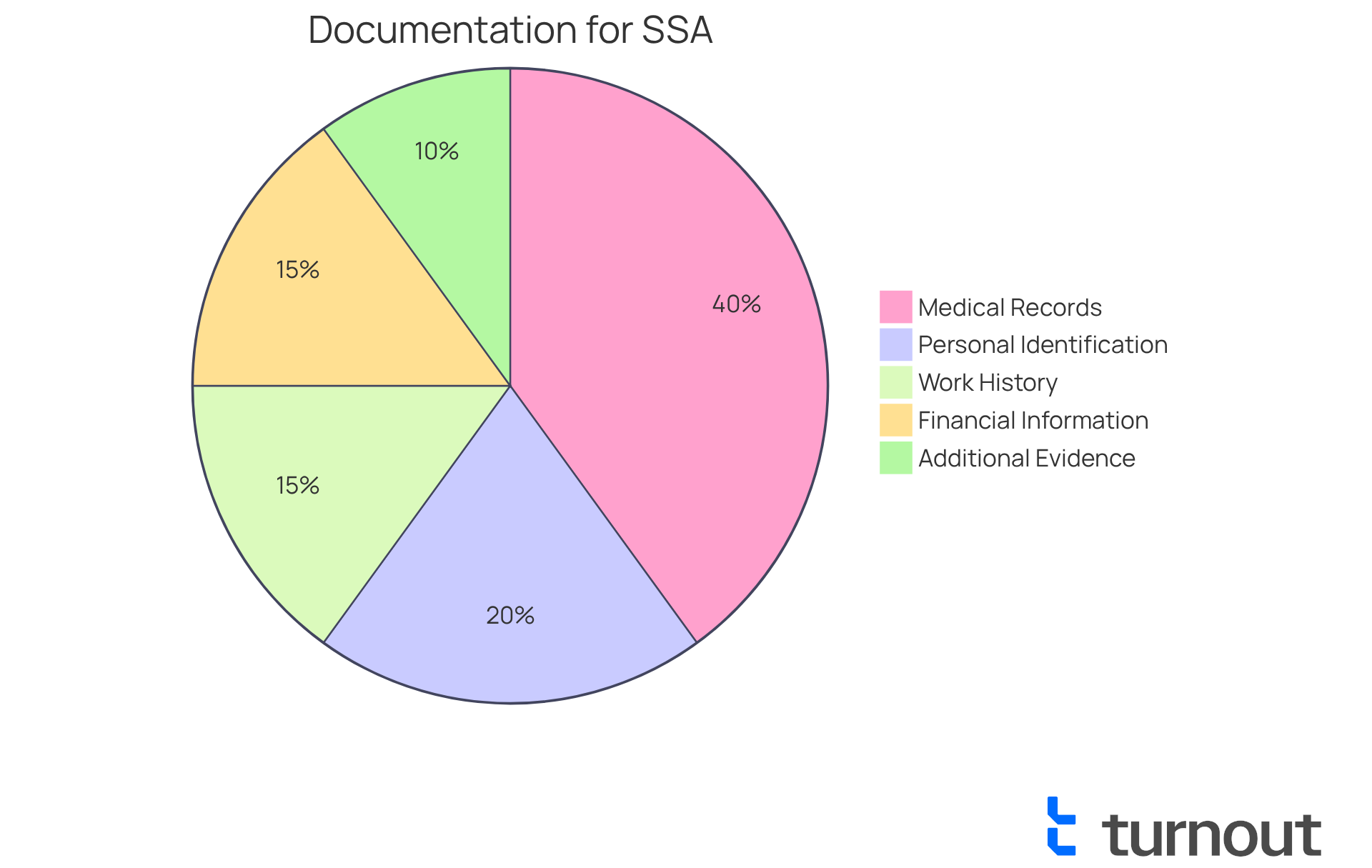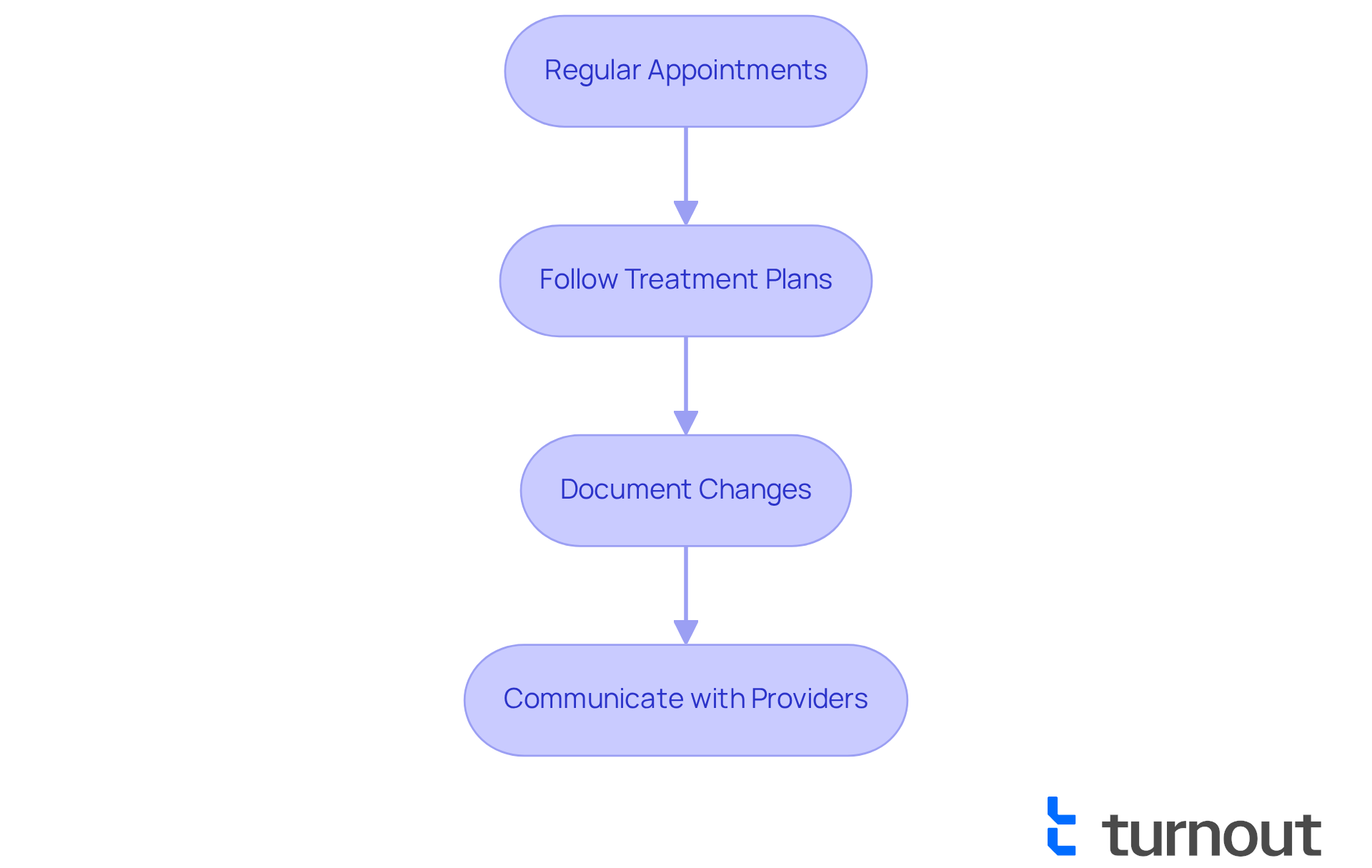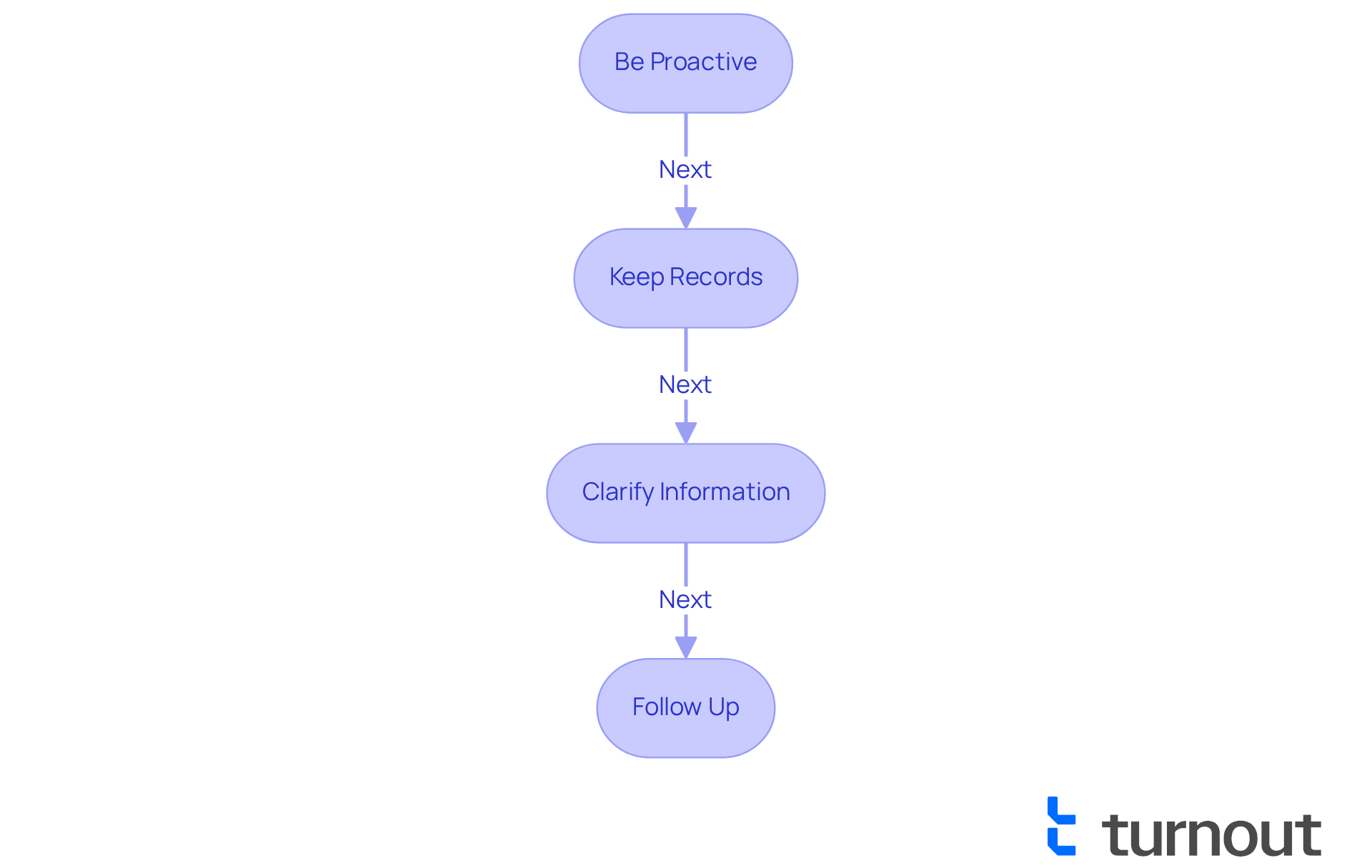Overview
Navigating the SSA review process can feel overwhelming, but you’re not alone in this journey. This article outlines four essential steps to help you master the process and secure the benefits you deserve. We understand that accurate documentation, consistent medical care, and effective communication with the SSA are crucial to your success.
From the initial application to potential appeals, each stage of the review is significant. By detailing these steps, we aim to highlight how thorough preparation and support can make a real difference. It’s common to feel uncertain, but understanding the process can significantly enhance your chances of approval.
Remember, you have the power to influence the outcome. Engaging actively in this process is key. We’re here to help you every step of the way, ensuring you feel supported and informed. Together, we can navigate this path toward securing your benefits.
Introduction
Navigating the complexities of the Social Security Administration (SSA) review process can feel overwhelming for many individuals seeking benefits. We understand that this journey is often filled with uncertainty and concern. Knowing the steps involved is crucial, as it not only helps secure your entitlements but also boosts your chances of approval.
With a staggering percentage of initial applications being denied, the stakes are high. How can you effectively master this intricate process and ensure your claim stands the best chance of success? This guide delves into essential steps and strategies designed to empower you. We’re here to provide you with the tools and knowledge needed to navigate the SSA review with confidence. You are not alone in this journey.
Understand the SSA Review Process
Navigating the SSA review can feel overwhelming. We understand that grasping its structure is crucial for obtaining your entitlements. Here’s a breakdown of the key stages:
-
Initial Application: This is where you submit your request for assistance. It’s vital to ensure that all information is accurate and complete to avoid delays. Did you know that approximately 43% of initial applications are denied due to not meeting the SSA's technical requirements? However, when considering those who didn’t meet technical requirements, around 30% of all applicants were ultimately accepted for benefits. The SSA offers resources and services to help you in this endeavor, ensuring your application is as robust as possible. Remember, they are not a legal firm and do not provide legal guidance.
-
Review of Medical Evidence: The SSA evaluates your medical records and any other documentation submitted to determine your eligibility. Strong medical documentation can significantly enhance your chances of approval. Applicants who maintain robust records often see faster outcomes. Moreover, candidates receiving professional assistance, like skilled non-legal advocates from Turnout, are three times more likely to obtain advantages. This highlights the importance of support throughout the procedure.
-
Decision Notification: After the review, you will receive a decision. If approved, you’ll be informed of your benefit amount and start date. If denied, a detailed explanation will accompany the decision, outlining the reasons for denial.
-
Reconsideration or Appeal: If your application is denied, you have the right to request a reconsideration or appeal the decision. The reconsideration stage has a national approval rate of approximately 15%. It’s common to feel uncertain during this process, but understanding the SSA review is essential for those who might need to contest a denial. Roughly half of candidates who satisfy technical criteria and contest their initial ruling are eventually granted approval at some stage in the procedure.
By familiarizing yourself with these stages and utilizing Turnout's resources, you can better prepare for each step and increase your chances of a successful outcome. Participating in the procedure proactively can create a considerable impact in managing the intricacies of the SSA. Remember, you are not alone in this journey; we’re here to help.

Gather Necessary Documentation
Navigating the SSA review process may seem overwhelming, but you are not alone. To help you through this journey, it’s essential to gather thorough documentation that demonstrates your eligibility for assistance. Turnout is here to streamline this process, offering support through trained nonlegal advocates who can guide you through the complexities of government benefits. Here’s a checklist of essential documents to prepare:
- Medical Records: Obtain detailed medical records from all healthcare providers involved in your treatment. This includes your diagnosis, treatment history, and any relevant test results.
- Personal Identification: Make sure you have copies of your Social Security card, birth certificate, and any other identification documents.
- Work History: Compile a record of your work history, including job titles, dates of employment, and descriptions of your job duties.
- Financial Information: Gather any financial documents that may be required, such as tax returns or bank statements, to demonstrate your financial situation.
- Additional Evidence: Consider including personal statements or letters from family members or friends that describe how your disability affects your daily life.
We understand that this process can be daunting. It’s important to note that while Turnout is not a legal firm and does not offer legal guidance, having these documents organized will simplify the SSA review process and help validate your claim. Research shows that claims with high-quality documentation have a significantly higher approval rate, highlighting the importance of thorough preparation. Remember, we’re here to help you every step of the way.

Maintain Consistent Medical Care
To strengthen your case, maintaining consistent medical care is crucial. We understand that navigating health challenges can be overwhelming, but taking these steps can help you effectively manage your health:
- Regular Appointments: Schedule routine check-ups with your healthcare providers. This not only aids in managing your condition but also ensures a continuous record of your medical history, which is vital for your claim.
- Follow Treatment Plans: Adhere to prescribed treatment plans, including medications, therapies, or lifestyle changes recommended by your healthcare team. Consistent treatment is linked to higher approval rates, as the ongoing care is emphasized in the SSA review.
- Document Changes: Keep a detailed record of any changes in your condition, including new symptoms or treatments. This information must be thorough and regularly revised, as it can be crucial during the SSA review, highlighting the changing nature of your disability.
- Communicate with Providers: Be transparent with your healthcare providers about your disability and its impact on your daily life. Open communication can lead to more comprehensive documentation that supports your claim.
Prioritizing your health and maintaining thorough records can provide the necessary evidence for the SSA review to support your benefits claim. It's common to feel uncertain about the process, but the SSA review indicates that nearly 60% of initial disability claims are denied due to insufficient medical evidence or documentation errors. Statistics show that claimants who maintain regular treatment are significantly more likely to receive an approval during the SSA review, with approval rates nearly doubling when consistent medical care is documented. Remember, you are not alone in this journey; we're here to help.

Communicate Effectively with the SSA
Effective communication with the Social Security Administration (SSA) is crucial for a successful SSA review, particularly when navigating SSD claims with the assistance of trained nonprofessional advocates. We understand that this process can feel overwhelming, but there are key strategies to enhance your interactions:
-
Be Proactive: Don’t wait for the SSA to reach out. If you have questions or need to provide additional information, contact them promptly to avoid delays. Remember, supporters of the initiative can guide you on effective communication strategies.
-
Keep Records: Document every communication with the SSA. Note the dates, times, and names of representatives you speak with. This record can be invaluable if issues arise later. Maintaining professional documentation is essential for effective communication and can significantly impact your case.
-
Clarify Information: When you receive requests for additional information, ensure you fully understand what is required. Don’t hesitate to ask for clarification if anything is unclear. Clear communication is essential for navigating the intricacies of the SSA system, and Turnout's trained representatives can help you with this.
-
Follow Up: After submitting documents or information, follow up to confirm receipt and processing status. This shows diligence and helps keep your case on track. Remember, SSA requests typically include specific response deadlines, usually ranging from 10 to 30 days.
By adopting these strategies, you can significantly enhance the efficiency of your SSA review. Clear and consistent communication not only aids in managing your situation but also promotes a better understanding of your rights and obligations. Utilize various communication channels available, such as written correspondence, online portals, and telephone, to ensure your messages reach the intended audience effectively. With Turnout's support, you can navigate these processes more confidently. You are not alone in this journey.

Conclusion
Mastering the SSA review process is essential for securing the benefits you may rightfully deserve. We understand that navigating this journey can feel daunting. By familiarizing yourself with the structured stages of the review—from the initial application to the potential for reconsideration—you can approach this process with confidence. Knowing the intricacies of the system can significantly enhance your chances of obtaining approval.
Key insights shared throughout this article highlight the importance of thorough preparation. Gathering necessary documentation, maintaining consistent medical care, and engaging in effective communication with the SSA are all critical steps. Each of these components strengthens your claim, as evidenced by statistics showing higher approval rates for those who are diligent in their approach. Utilizing available resources, such as non-legal advocates, can also provide invaluable support in this endeavor.
Ultimately, you don’t have to face the SSA review process alone. By taking proactive steps, keeping communication open, and ensuring all documentation is in order, you can navigate the complexities of the SSA system more effectively. This not only increases the likelihood of a successful outcome but also reinforces the significance of being informed and prepared in your pursuit of necessary benefits. Remember, we're here to help, and you are not alone in this journey.
Frequently Asked Questions
What is the first step in the SSA review process?
The first step is the Initial Application, where you submit your request for assistance. It's important to ensure that all information is accurate and complete to avoid delays.
What percentage of initial applications are denied by the SSA?
Approximately 43% of initial applications are denied due to not meeting the SSA's technical requirements.
What happens after the SSA reviews the medical evidence?
After reviewing the medical evidence, the SSA will notify you of their decision. If approved, you’ll be informed of your benefit amount and start date. If denied, you will receive a detailed explanation outlining the reasons for the denial.
What can improve my chances of approval during the SSA review?
Strong medical documentation can significantly enhance your chances of approval. Additionally, applicants who receive professional assistance are three times more likely to obtain benefits.
What should I do if my application is denied?
If your application is denied, you have the right to request a reconsideration or appeal the decision.
What is the approval rate for reconsideration requests?
The national approval rate for reconsideration requests is approximately 15%.
What is the likelihood of success if I contest my initial ruling?
Roughly half of the candidates who meet the technical criteria and contest their initial ruling are eventually granted approval at some stage in the process.
How can Turnout assist me during the SSA review process?
Turnout offers resources and services to help you prepare for each step of the SSA review process, increasing your chances of a successful outcome.




